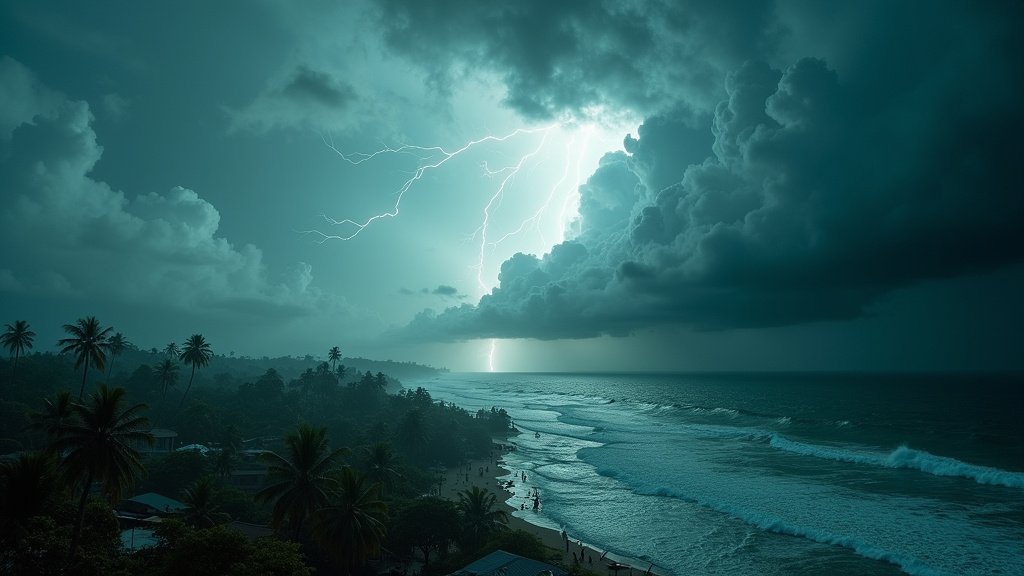KINGSTON, JAMAICA – In the harrowing aftermath of Hurricane Melissa, a Category 5 storm that inflicted widespread devastation across Jamaica, the nation is engaged in a monumental mobilization of aid and recovery efforts. The impact of Hurricane Melissa Jamaica is profound, with the storm recognized as one of the most powerful to ever make landfall on the island, leaving a deep scar on communities, impacting hundreds of thousands, and crippling essential infrastructure.
The catastrophic event struck Jamaica’s south coast on October 28, 2025, near New Hope, Westmoreland, unleashing winds of up to 185 miles per hour and triggering immense destruction. The storm has resulted in a tragic loss of life, with official reports confirming at least 32 fatalities within Jamaica, and the grim toll across the wider Caribbean exceeding 60. Many communities remain dangerously isolated, cut off by impassable roads and damaged infrastructure, which severely complicates the delivery of much-needed aid following Hurricane Melissa Jamaica.
Immediate Devastation and Urgent Humanitarian Needs from Hurricane Melissa Jamaica
The immediate aftermath has painted a stark picture of destruction. Coastal towns like Black River have been particularly ravaged, with reports indicating that nearly 90% of buildings lost their roofs, transforming the town center into a scene of utter devastation. The island is grappling with extensive power outages, affecting over 77% of the population and significantly hindering communication lines. Critical health infrastructure has also suffered severe damage, with reports of collapsed roofs at hospitals, critical oxygen shortages, and an overwhelming demand for medical supplies and clean water, underscoring the need for Jamaica disaster relief.
Survivors are in desperate need of basic necessities, including food, potable water, hygiene supplies, and safe shelter, as countless homes and personal belongings have been lost. The World Food Programme (WFP) is actively involved in distributing life-saving food supplies, aiming to reach an estimated 1.1 million individuals across the affected Caribbean region. Humanitarian organizations such as Project HOPE are on the ground, providing essential hygiene kits, establishing temporary health clinics, and offering crucial psychological first aid as part of the Humanitarian assistance Jamaica efforts. The International Federation of Red Cross and Red Crescent Societies (IFRC) has initiated an emergency appeal to marshal resources for immediate relief and long-term recovery, encompassing shelter repair and livelihood restoration initiatives following the Hurricane Melissa Jamaica event.
Coordinated Response: Government and International Support for Hurricane Recovery Efforts
The Government of Jamaica has taken swift action, declaring the entire island a disaster area to facilitate and coordinate response mechanisms. Prime Minister Andrew Holness has underscored the indispensable role of international assistance, stating that “international support is crucial” for the nation’s arduous recovery journey. The UN Secretary-General has conveyed solidarity with the affected population and issued a strong call for the mobilization of substantial resources for Caribbean hurricane aid.
The United Nations Office for the Coordination of Humanitarian Affairs (OCHA) is collaborating with its partners to bolster government responses and expedite the delivery of critical aid. Furthermore, the UN Central Emergency Response Fund (CERF) has allocated $4 million to amplify humanitarian operations in Jamaica, with additional funding designated for other severely impacted Caribbean nations. The U.S. Department of State has also pledged support for the affected communities, working in conjunction with UN agencies and non-governmental organizations (NGOs) to deliver vital supplies and support search-and-rescue missions, contributing to the National disaster response. Japan has contributed emergency relief supplies, including tents and sleeping pads, channeled through the Japan International Cooperation Agency (JICA).
To centralize and streamline support, the Jamaican government has launched the “Support Jamaica” website, an official online platform dedicated to mobilizing donations, coordinating relief efforts, and facilitating recovery initiatives. The Ministry of Finance and the Public Service has also implemented customs relief measures for imported supplies and donations to aid in the recovery process after Hurricane Melissa Jamaica.
Resilience in the Face of Adversity and Hurricane Melissa Jamaica Impact
Despite the immense scale of the destruction from Hurricane Melissa Jamaica, a remarkable spirit of resilience is evident throughout Jamaica. Volunteer groups are actively engaged in distributing essential supplies and clearing debris, showcasing the island’s strong community bonds. Organizations like the Global Empowerment Mission (GEM) have committed to sustained, long-term recovery, establishing robust logistics networks and warehouses to support rebuilding endeavors.
The road to full recovery is anticipated to be lengthy and challenging, with estimated damages potentially reaching $8 billion. Hurricane Melissa has delivered a severe blow to Jamaica’s agricultural sector, flattening crops and destroying fishing infrastructure, which directly impacts the nation’s food security and overall economy. Drawing on lessons from past disasters and proactive measures such as the “Making Cities Resilient 2030” initiative and the country’s investment in catastrophe bonds, Jamaica is strategically positioning itself to enhance its resilience against future climate-related threats. The unfolding news of this disaster highlights the critical importance of sustained international solidarity and community-led solutions as Jamaica endeavors to rebuild and fortify its capacity to withstand future challenges, emphasizing the need for robust Hurricane recovery efforts.

